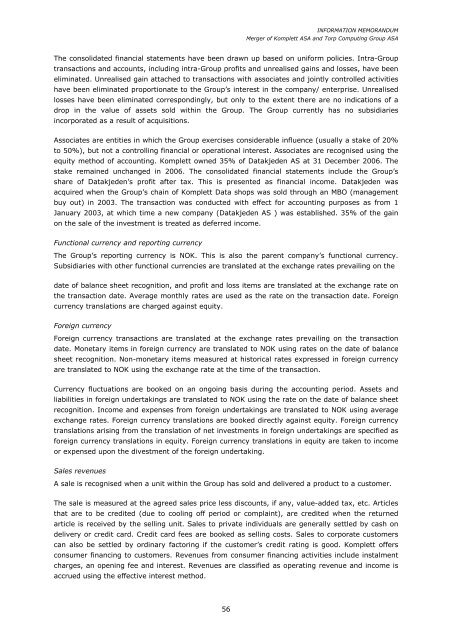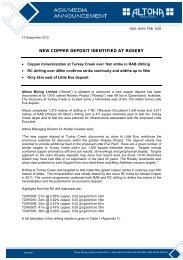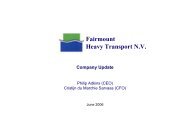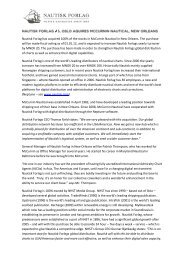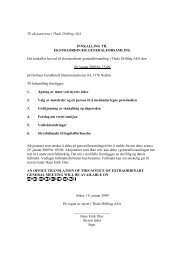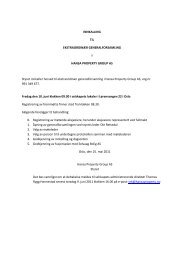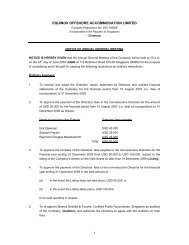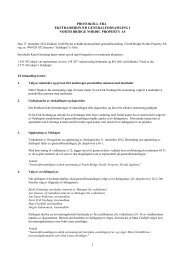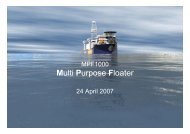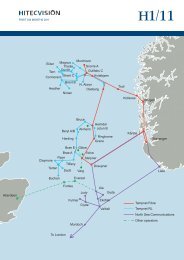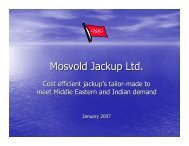Torp Computing Group ASA
Torp Computing Group ASA
Torp Computing Group ASA
You also want an ePaper? Increase the reach of your titles
YUMPU automatically turns print PDFs into web optimized ePapers that Google loves.
56<br />
INFORMATION MEMORANDUM<br />
Merger of Komplett <strong>ASA</strong> and <strong>Torp</strong> <strong>Computing</strong> <strong>Group</strong> <strong>ASA</strong><br />
The consolidated financial statements have been drawn up based on uniform policies. Intra-<strong>Group</strong><br />
transactions and accounts, including intra-<strong>Group</strong> profits and unrealised gains and losses, have been<br />
eliminated. Unrealised gain attached to transactions with associates and jointly controlled activities<br />
have been eliminated proportionate to the <strong>Group</strong>’s interest in the company/ enterprise. Unrealised<br />
losses have been eliminated correspondingly, but only to the extent there are no indications of a<br />
drop in the value of assets sold within the <strong>Group</strong>. The <strong>Group</strong> currently has no subsidiaries<br />
incorporated as a result of acquisitions.<br />
Associates are entities in which the <strong>Group</strong> exercises considerable influence (usually a stake of 20%<br />
to 50%), but not a controlling financial or operational interest. Associates are recognised using the<br />
equity method of accounting. Komplett owned 35% of Datakjeden AS at 31 December 2006. The<br />
stake remained unchanged in 2006. The consolidated financial statements include the <strong>Group</strong>’s<br />
share of Datakjeden’s profit after tax. This is presented as financial income. Datakjeden was<br />
acquired when the <strong>Group</strong>’s chain of Komplett Data shops was sold through an MBO (management<br />
buy out) in 2003. The transaction was conducted with effect for accounting purposes as from 1<br />
January 2003, at which time a new company (Datakjeden AS ) was established. 35% of the gain<br />
on the sale of the investment is treated as deferred income.<br />
Functional currency and reporting currency<br />
The <strong>Group</strong>’s reporting currency is NOK. This is also the parent company’s functional currency.<br />
Subsidiaries with other functional currencies are translated at the exchange rates prevailing on the<br />
date of balance sheet recognition, and profit and loss items are translated at the exchange rate on<br />
the transaction date. Average monthly rates are used as the rate on the transaction date. Foreign<br />
currency translations are charged against equity.<br />
Foreign currency<br />
Foreign currency transactions are translated at the exchange rates prevailing on the transaction<br />
date. Monetary items in foreign currency are translated to NOK using rates on the date of balance<br />
sheet recognition. Non-monetary items measured at historical rates expressed in foreign currency<br />
are translated to NOK using the exchange rate at the time of the transaction.<br />
Currency fluctuations are booked on an ongoing basis during the accounting period. Assets and<br />
liabilities in foreign undertakings are translated to NOK using the rate on the date of balance sheet<br />
recognition. Income and expenses from foreign undertakings are translated to NOK using average<br />
exchange rates. Foreign currency translations are booked directly against equity. Foreign currency<br />
translations arising from the translation of net investments in foreign undertakings are specified as<br />
foreign currency translations in equity. Foreign currency translations in equity are taken to income<br />
or expensed upon the divestment of the foreign undertaking.<br />
Sales revenues<br />
A sale is recognised when a unit within the <strong>Group</strong> has sold and delivered a product to a customer.<br />
The sale is measured at the agreed sales price less discounts, if any, value-added tax, etc. Articles<br />
that are to be credited (due to cooling off period or complaint), are credited when the returned<br />
article is received by the selling unit. Sales to private individuals are generally settled by cash on<br />
delivery or credit card. Credit card fees are booked as selling costs. Sales to corporate customers<br />
can also be settled by ordinary factoring if the customer’s credit rating is good. Komplett offers<br />
consumer financing to customers. Revenues from consumer financing activities include instalment<br />
charges, an opening fee and interest. Revenues are classified as operating revenue and income is<br />
accrued using the effective interest method.


